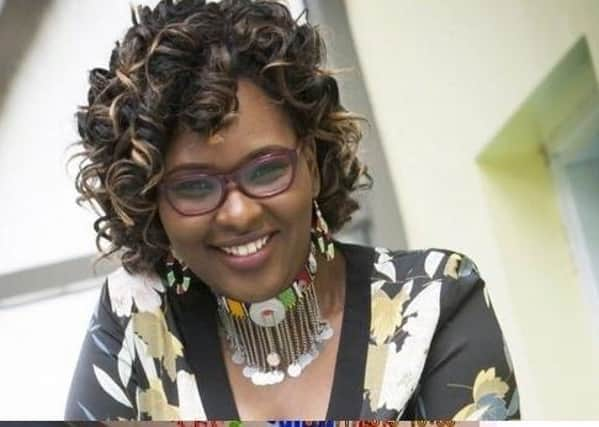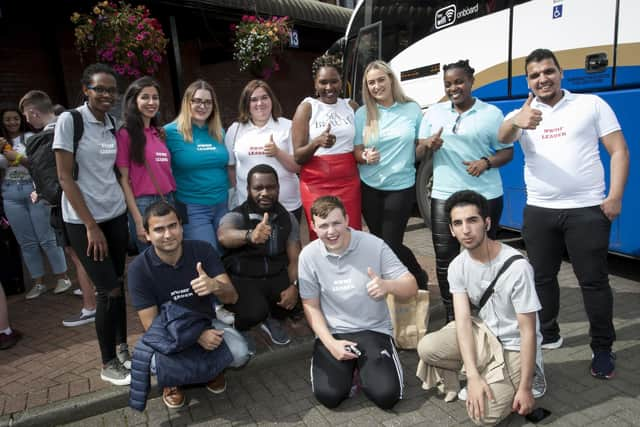OPINION: Engaging Black & Minority Ethnic people and building a peaceful, shared Ireland


A series of recent events called into question the way we see things and make us reappraise our old certainties: BREXIT, the increasing recognition across the globe that Black Lives DO Matter and the disproportionate impact of Covid-19 on Black and Minority Ethnic people.
These events should challenge us all to re-examine how we manage Northern Ireland’s increasing diversity. How do we respond to our increasing diversity in these radically changed circumstances? What is our vision for the society that our children and grandchildren will inherit?
Advertisement
Hide AdAdvertisement
Hide AdIs it a society of segregated communities, adding black, brown and white into our existing Orange and Green colour palette where majorities and minorities come along together with different rights and responsibilities, loosely bound together by mutual ignorance and stereotypes? Or dare we hope for more – for a vibrant and open society without discrimination where we all accept and respect each other’s human rights?


These questions are key to the wider conversations we are having about what a united and shared Ireland could look like. In these conversations– which must include the constitutional question too – it is vital that the voices of minority ethnic people are listened to. Critically, ensure that tackling those racial inequalities- laid bare by Black Lives Matter and Covid-19 pandemic are at the centre of our plans.
A shared vision for a shared community must be based on a shared understanding of the competing trade-offs facing different groups. These conversations should encompass all groups, not just those that can shout the loudest. In the 20 years since the Good Friday Agreement, Ireland North and South have become even more diverse. Not only has there been a significant increase in the number of migrants settling here - but more people reject the label of Catholic or Protestant. To put it simply – we are no longer just “two tribes”. We are many different communities, developing, shifting, changing and constantly redefining ourselves.
We must ensure that the legacy of Northern Ireland conflict keeps pace. Recognising the language and institutions to support equality and human rights were established for two communities is key to making change. For example, the standard Job Centre equality monitoring form gives only two options. And guess which two? This makes ethnic minorities invisible. And this legacy is so deeply engrained. Minority ethnic interests in TBUC strategy are little more than an afterthought and, The New Decade, New Approach plan pushes us to the margins, language matters.
Advertisement
Hide AdAdvertisement
Hide AdThe fundamental principle of a shared community is equal status, full human rights and peaceful coexistence. An Ireland that is a strong society must encompass all communities and be based on equal rights and respect for all. These conditions are essential to a shared Ireland. People of minority ethnic backgrounds are facing increasing barriers and threats to their efforts to secure their rights, BME led movements need sustainable resourcing, and access to the technical capacity and networks to engage with political systems.
Wee need help to cooperate with others, not just in the next town but in different jurisdictions and to work with movements and activists across geographies and causes. We do not want to be permanently the foot soldiers of change but the leaders. This is how we will build our place in our society.
The goal of boosting shared prosperity puts a spotlight on the welfare of the most marginalised populations in a shared Ireland – including minority ethnic people. Equal opportunities, greater social mobility, and inclusive growth for all will benefit all. This aspiration can be served by greater collaboration between BME and traditionally “indigenous” organisations.
This will shift the conversation from ‘BME issues’ to broader economic, political, cultural and social issues where we all have shared ownership and responsibility. Treating BME people as equals and ensuring that their voices in conversations and debate around equality, justice and a shared Ireland are not only included but also valued, is in the interests of us all.
Advertisement
Hide AdAdvertisement
Hide AdThe vast majority of minority ethnic people don’t want segregated ghettoes, they want to live in an open, free society where they can contribute and have that feeling of ownership and belonging. We must find new ways to collaborate and tackle social injustice challenges in an inclusive manner. Co-design is a highly collaborative practice where people bring together their skills, expertise, cultural context, and lived experiences to produce solutions to pressing challenges. Co-design allows participants to not only identify the challenges but design solutions which benefit them. Sanders & Stapper (2008) argue that “in a co-design process, the roles change: the person who will eventually be served through the design process is given the position of ‘experts of their experience’, and plays a large role in knowledge development, idea generation and concept development.
Like so many BME people, I am desperately knocking at the door and looking to be let in. We all want to be accepted and treated as equals - we deserve it.
In my journey, I am reminded of Dr. Martin Luther King Jr. He talked about the philosophy and discipline. He said we are all complicit when we tolerate injustice. He highlights it is not enough to say it will get better by and by. He emphasises that each of us has a moral obligation to stand up, speak up and speak out. He also stated when you see something that is not right, you must say something. You must do something. I believe a shared and equal society is not a state; it is an act, and each person regardless of their gender, race, religion, ethnicity, age, sexual orientation, or disability must do their part to help build a nation that is at peace with itself. We need to open the doors and let them in.